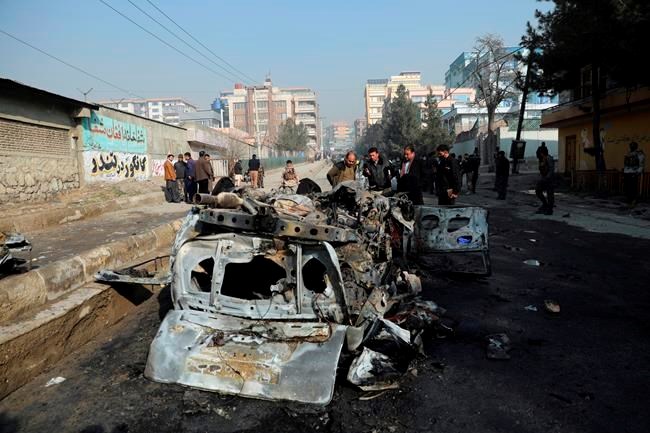KABUL — A roadside bomb exploded in Afghanistan's capital Sunday, killing at least three people in a vehicle. It was the latest attack to take place as government negotiators in Qatar resume peace talks with the Taliban.
Tariq Arian, spokesman for the interior minister, said a spokesman for the ministry's public protection forces — a security force — was one of the three killed in the attack. One other person was wounded he said.
No one immediately claimed responsibility.
The Islamic State group has claimed responsibility for multiple attacks in the capital in recent months, including on educational institutions that killed 50 people, most of them students. IS has claimed responsibility for rocket attacks in December targeting the major U.S. base in Afghanistan. There were no casualties.
Taliban militants have meanwhile continued their insurgency against government forces while keeping their promise not to attack U.S. and NATO troops.
Sunday's attack comes as Afghan negotiators are to resume talks with the Taliban aimed at ending decades of relentless conflict. Frustration and fear have grown over a spike in violence and both sides are blaming each other.
The stop-and-go talks between the Taliban and the government come amid growing doubt over a U.S.-Taliban peace deal brokered by outgoing President Donald Trump's administration. An accelerated withdrawal of U.S. troops ordered by Trump means just 2,500 American soldiers will still be in Afghanistan when President-elect Joe Biden takes office on Jan. 20.
Biden has advocated for keeping a small intelligence-based presence in Afghanistan, but Taliban leaders have flatly rejected any foreign troops.
The attack comes after an airstrike Saturday that killed at least 12 civilians in western Nimroz province of Afghanistan, the officials said.
Nimroz provincial council chief Baz Mohammad Naser said Sunday that the victims are members of two families.
One of the victims of the airstrike who was wounded is hospitalized, said Nasir Ahmad Hebat, the provincial health department chief.
The Afghan
According to the statement, the Afghan
A U.S.-based institute warned in December that there has been a dramatic increase in airstrikes conducted by Afghan government forces from July to September in 2020, attacks that have led to a sharp rise in civilian casualties.
The Watson Institute of International and Public Affairs, a research
In its report, the institute also said that from 2017 through 2019, civilian deaths due to U.S. and allied forces’ airstrikes in Afghanistan dramatically increased. In 2019, airstrikes killed 700 civilians — more civilians than in any other year since the beginning of the war in 2001 and 2002.
Rahim Faiez And Tameem Akhgar, The Associated Press


